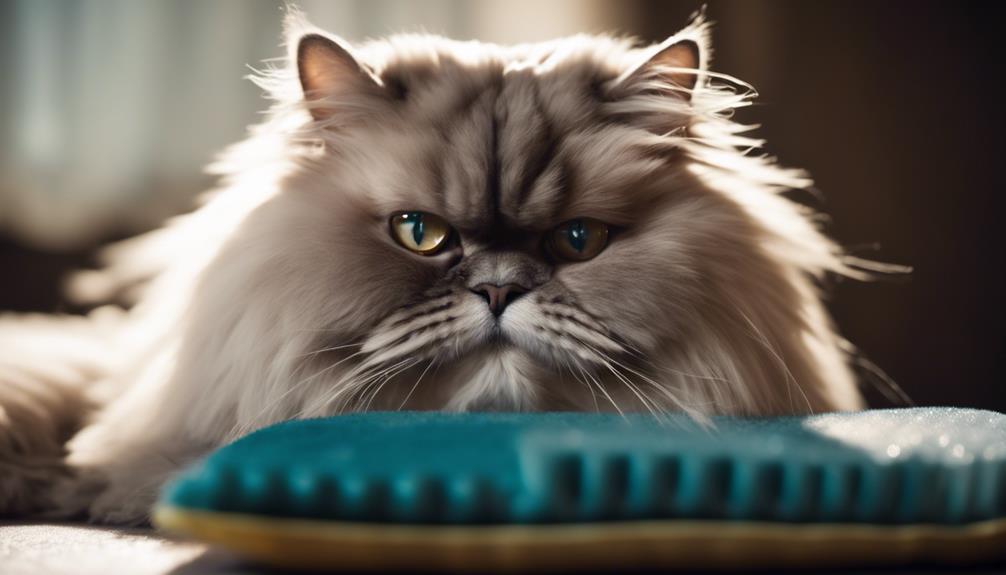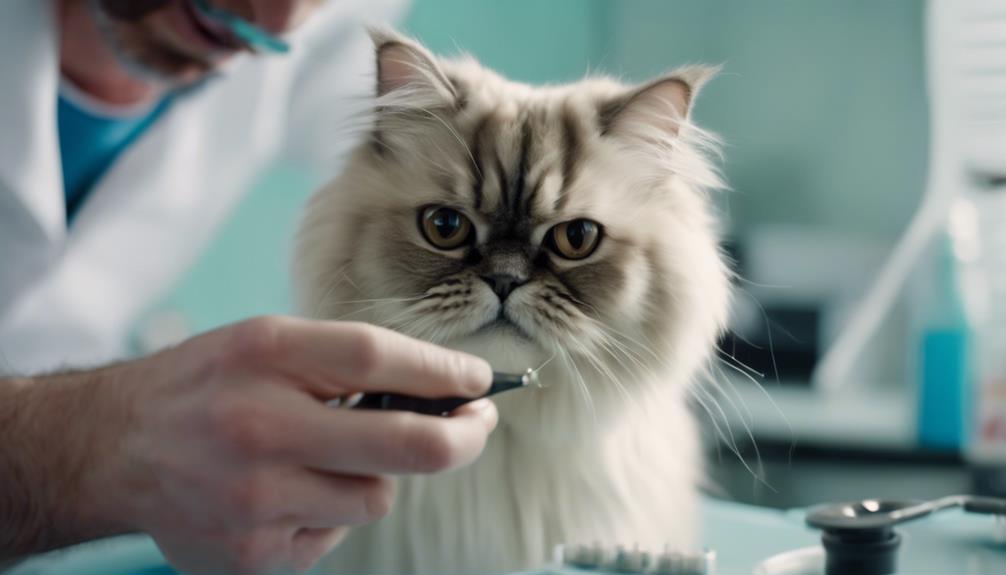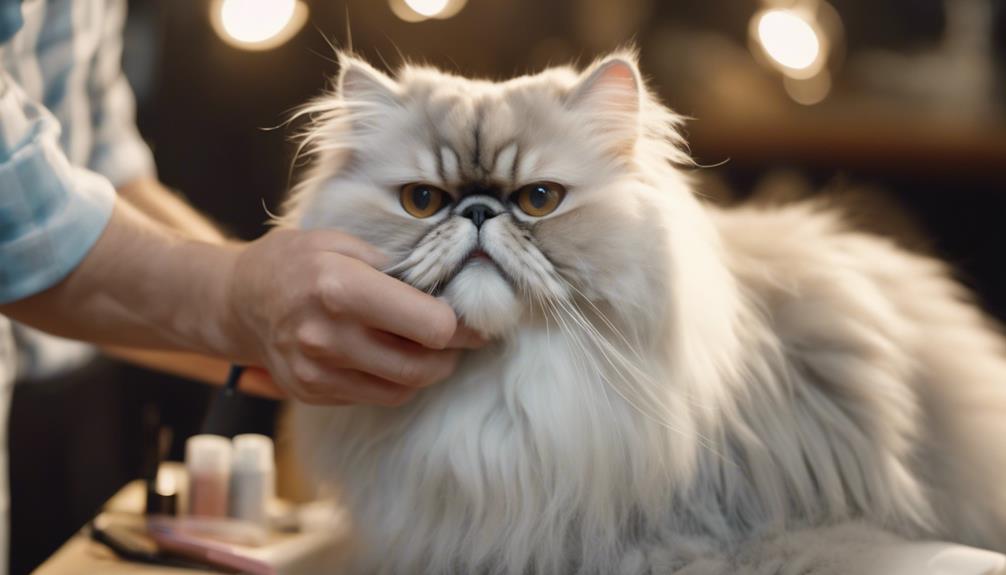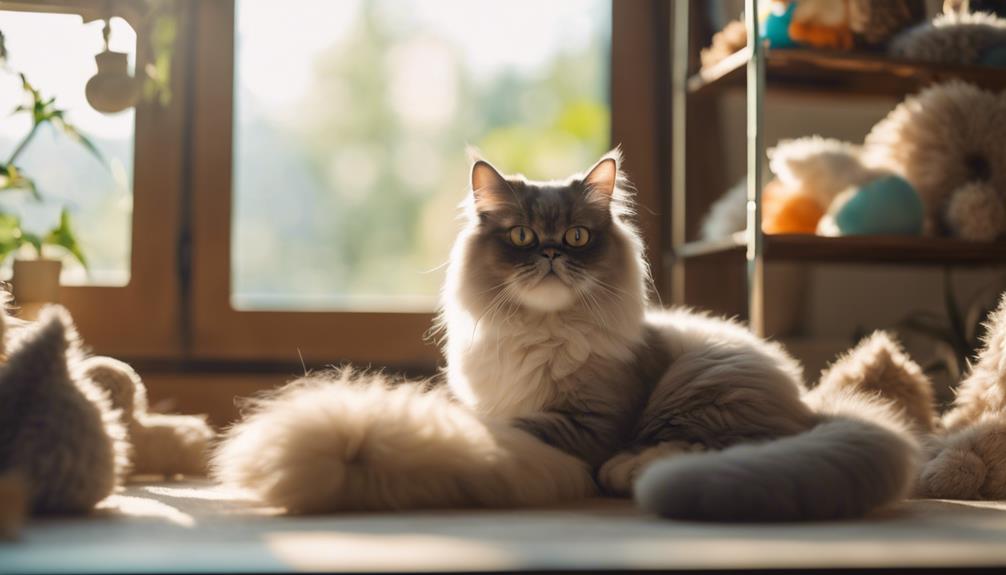What Special Care Do Persian Cats Require?

Special care requirements are essential for ensuring the well-being of Persian cats. These regal felines have unique needs that owners must address to keep them happy and healthy.
Regular grooming is a crucial aspect of caring for a Persian cat. Their long fur can easily become tangled and matted, leading to discomfort and potential health issues. Daily brushing and occasional baths are necessary to prevent these problems.
In addition to grooming, Persian cats require a calm and stress-free environment. These sensitive cats are easily affected by changes in their surroundings, so it's essential to provide a stable and peaceful home for them.
Finally, regular veterinary check-ups are important for monitoring the health of Persian cats. Due to their flat faces, they are prone to respiratory issues and dental problems. Routine visits to the vet can help detect and address these issues early on, ensuring a long and healthy life for your beloved feline companion.
Coat Care for Persian Cats
To maintain the luxurious coat of a Persian cat, daily brushing is essential to prevent matting and skin infections. Persian cats have long, flowing fur that requires regular grooming to keep it looking healthy and beautiful. Using a metal comb with both narrow and wide-spaced teeth can help detangle their thick coat efficiently. It's recommended to start grooming your Persian cat at a young age to help them get used to the process and ensure they accept it as part of their routine.
Regular grooming not only helps in preventing matting and skin infections but also contributes to the overall health and appearance of your Persian cat's coat. Occasionally bathing your Persian cat can also aid in keeping their coat clean and free from dirt or debris. By dedicating time each day to grooming your Persian cat, you can help them maintain their stunning coat and ensure they stay happy and healthy.
Dental Health for Persians

Maintenance of good dental health is crucial for Persian cats, as their flat faces and crowded teeth make them particularly prone to dental disease, including tartar buildup that can lead to gum inflammation, tooth decay, and bad breath. Regular dental exams and professional cleanings are essential to maintain oral health in Persians. Severe dental disease can result in tooth loss, abscesses, and damage to internal organs, emphasizing the importance of prevention through dental care, proper nutrition, and regular veterinary check-ups.
| Dental Health Tips for Persian Cats | Description |
|---|---|
| Regular Brushing | Brushing your Persian cat's teeth daily can help prevent tartar buildup and maintain oral hygiene. |
| Dental Treats | Providing dental treats designed to reduce plaque and tartar can aid in promoting healthy teeth and gums. |
| Professional Cleanings | Regular visits to the veterinarian for professional cleanings are crucial to address any dental issues promptly. |
Nutrition Needs of Persians

Persian cats benefit from a balanced diet rich in protein to meet their unique nutritional requirements effectively. When considering the nutrition needs of Persians, it's crucial to consult a veterinarian to determine the specific calorie requirements based on factors such as age, weight, and activity level.
Here are essential points to keep in mind:
- High-Quality Food: Choose complete and balanced cat food that meets AAFCO standards to ensure your Persian cat receives the necessary nutrients for optimal health.
- Obesity Prevention: Monitor your Persian cat's weight regularly to prevent obesity, which can lead to various health issues. Adjust their diet and exercise routine as needed to maintain a healthy weight.
- Hydration: Provide clean, fresh water at all times to promote good health and well-being in Persian cats. Proper hydration is essential for their overall health and helps prevent urinary issues.
Health Monitoring for Persians
Regular veterinary check-ups are essential for ensuring the well-being of Persian cats. These visits allow for early detection of any health issues and provide an opportunity to discuss preventive care.
Watching for symptoms of common conditions like heart disease and FLUTD is crucial for maintaining the health of Persian cats.
Regular Vet Check-Ups
Ensuring the well-being of Persian cats involves regular veterinary check-ups for effective health monitoring. These check-ups play a vital role in safeguarding the health of Persian cats by:
- Detecting early signs of potential health issues that are common in this breed.
- Providing timely intervention and treatment for any emerging health problems.
- Offering tailored care plans and preventive measures to maintain the overall well-being of Persian cats.
Regular vet check-ups not only help in identifying health concerns promptly but also allow veterinarians to create personalized strategies to address specific needs of Persian cats, ensuring they lead healthy and happy lives.
Watch for Symptoms
To effectively monitor the health of Persian cats, it's crucial to diligently observe and recognize any symptoms indicative of common health issues specific to this breed. Keep a close eye out for signs such as reduced appetite, lethargy, vomiting, or changes in behavior, which could signal underlying problems like kidney disease, hypertrophic cardiomyopathy, or progressive retinal atrophy.
Regular veterinary check-ups play a vital role in the early detection and management of potential health issues in Persian cats. Staying informed about breed-specific health concerns enables proactive measures to address any symptoms promptly. Providing a balanced diet, regular exercise, and a safe environment are essential components of maintaining the overall health and well-being of Persian cats.
Grooming Tips for Persians

Daily grooming plays a vital role in preventing matting and skin infections in Persian cats. To ensure your Persian cat's coat remains healthy and luxurious, follow these grooming tips:
- Start Young: Introduce grooming routines from a young age to accustom your Persian cat to the process, promoting acceptance and cooperation.
- Use the Right Tools: Invest in a metal comb with both narrow and wide-spaced teeth to effectively detangle their thick fur without causing discomfort.
- Regular Maintenance: Brush your Persian cat's coat regularly, starting from the roots to prevent matting and maintain the health and appearance of their luxurious fur. Additionally, occasional baths are necessary to keep their coat clean and prevent skin infections.
Exercise Requirements for Persians

Introducing appropriate exercise routines tailored to their low to moderate activity needs is crucial for maintaining the overall health and well-being of Persian cats. These elegant felines have lower exercise requirements compared to more active breeds, preferring short play sessions and interactive toys for mental stimulation.
To encourage light physical activity, providing climbing structures or scratching posts can be beneficial. Regular, gentle exercise not only helps prevent obesity but also contributes to their overall health. Owners must customize exercise routines to meet their Persian cat's individual needs and preferences, ensuring they stay engaged and healthy.
Environmental Enrichment for Persians

Persian cats thrive in environments that offer a variety of stimulating activities to engage their curious and playful nature. To ensure the well-being of these majestic felines, cat fanciers should consider the following environmental enrichment tips:
- Provide a Quiet Space: Create a designated area where your Persian cat can retreat for rest and relaxation, catering to their laid-back nature.
- Offer Interactive Toys and Scratching Posts: Stimulate your Persian cat with interactive toys to prevent boredom, promote physical activity, and satisfy their natural scratching instincts.
- Socialize Early and Ensure Hazard-Free Environment: Socialize your Persian cat early on to encourage good behavior and mental well-being. Additionally, keep your home hazard-free by removing toxic plants to safeguard the health of your beloved feline companion.
Frequently Asked Questions
Do Persian Cats Have Special Needs?
Persian cats do have special needs. Their grooming requirements, health concerns, and dietary needs are crucial. Regular veterinary check-ups help monitor potential issues. Creating a calm environment, socializing, and bonding activities are essential for their well-being.
Are Persian Cats High Maintenance?
Persian cats are indeed high maintenance, needing daily grooming to prevent matting and hairballs. Regular baths and eye care are essential. Nails should be trimmed every 2-3 weeks. Their luxurious coats demand attention to keep them healthy and happy.
What Are the Basic Needs of Persian Cat?
Persian cats need daily grooming, a balanced diet, regular exercise, health check-ups, interactive playtime, enriched environment, socialization, proper sleep, training for behavior, and bonding with their owners. These elements ensure a happy, healthy Persian cat.
What Precautions Should Persian Cats Take?
For Persian cats, regular grooming, health monitoring, a balanced diet, exercise, and environmental enrichment are vital. Owners should also focus on dental care, shedding control, allergy prevention, and behavioral training to ensure their well-being.









